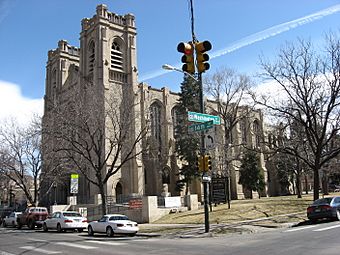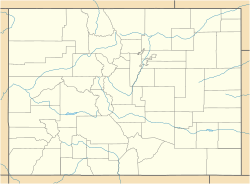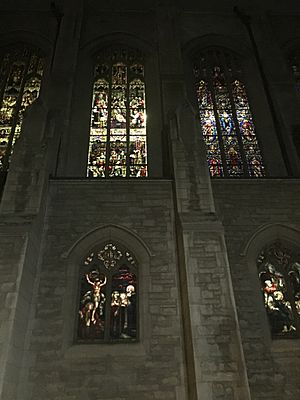Cathedral of St. John in the Wilderness facts for kids
Quick facts for kids |
|
|
Saint John's Cathedral
|
|

Streetside view of the cathedral, March 2009
|
|
| Location | 14th and Washington streets Denver, Colorado United States |
|---|---|
| Built | 1909-1911 |
| Architect | Tracy and Swartwout |
| Architectural style | Late Gothic Revival |
| Website | https://sjcathedral.org |
| NRHP reference No. | 75000513 |
| Added to NRHP | August 1, 1975 |
Saint John's Cathedral is a historic church in Denver, Colorado. It is the main church for the Episcopal Diocese of Colorado. The Episcopal Church is a part of the worldwide Anglican Communion.
Construction on the current building started in 1909. The first service was held there in 1911. Because of its historical importance, it was added to the National Register of Historic Places in 1975.
Contents
History of the Cathedral
The story of Saint John's Cathedral begins in 1860. A priest named Father John H. Kehler came from Virginia to the mining camps that later became the city of Denver. He held the first Episcopal Church services in the area.
Father Kehler started a parish called St. John's in the Wilderness. It got this name because the next closest Episcopal parish was 700 miles away in Kansas. It truly felt like it was in the wilderness!
The First Building and a New Idea
The first cathedral building was located at 20th and Welton streets. Its first services were held in 1881. The cathedral's first leader, Dean H. Martyn Hart, had a big idea. In 1887, he worked with other Denver church leaders to create the Denver Charity Organization.
This was the first community-wide charity fund in the United States. It collected money to help people in need. This organization later became known as the United Way.
Building the Cathedral We See Today
A fire in 1903 damaged the first church. This led to plans for the grand cathedral that stands today at 14th and Washington streets. In 1908, a contest was held to choose a design for the new building. The winning design came from a New York architecture firm called Tracy and Swartwout.
Construction Challenges
Work on the new Saint John's Cathedral began in 1908. The first design was very complex. It used special supports called flying buttresses, which are common in Gothic Revival churches. This would have allowed for thinner walls and large, beautiful windows.
However, this design was too expensive to build. The plan was changed to be smaller and simpler. But even the bids for this second design were too high. A third design was made, which removed the buttresses and made the walls thicker and heavier to support the roof.
This change caused a major problem. The foundation, which had already been built for an earlier design, was not strong enough for the heavier walls. As construction went on, the massive cathedral began to sink! Workers had to take down some walls and fix the foundation before they could continue.
Because of these issues, only the main part of the church, called the nave, was completed. The nave is 185 feet long, 52 feet wide, and has a 65-foot-high ceiling. The grand tower and other sections from the original plan were never built.
Famous Features and People
The cathedral is famous for its stunning stained-glass windows. They were created by the studio of Charles Jay Connick, a celebrated American artist.
In 2002, Byron White, who served as an Associate Justice of the Supreme Court of the United States, was buried at St. John's Cathedral.
See also
 | Audre Lorde |
 | John Berry Meachum |
 | Ferdinand Lee Barnett |




